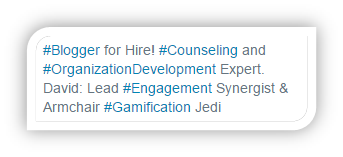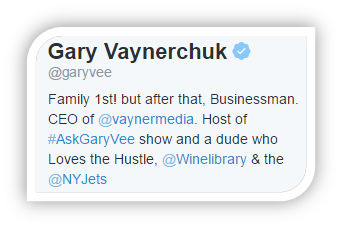If you have a Twitter account for your business, or are thinking of starting one, you will need to summarize exactly what you do in 280 characters. Think of it as a short elevator speech. It takes some finesse to find the right words. Here are a couple of accounts you can learn from:
Avoid (only) Hashtags
It’s tempting to take your businesses keywords and add a hashtag in front of them, mash them together, and call it a Twitter bio. But this does nothing to inspire people to follow you nor does it say anything about your business other than “I am a spambot.”
If you feel the need to use an inordinate amount of hashtags do it with some personality like this:
Ditch the Unbelievable Claims
Social media and marketing businesses sometimes fall into this trap. They desperately want to prove their abilities and in doing so, make outrageous claims. These claims, whether true or not, make people feel like they’re about to be roped into a pyramid scheme if the follow you.
This Twitter bio was engaging, until the last sentence. Now I’m not sure if she’s human or just another add-followers-quick scheme.
Don’t be Dull
A Twitter bio, even one for business, should give people some insight into who you are. Don’t make it all about what you sell. Give someone a reason to do business with you. With the Internet, most people have unlimited choices on products or services. Geography no longer limits our selections. For that reason, your competition has increased exponentially. Differentiating your product or service is becoming more and more difficult. But the difference doesn’t lie in what you sell, the difference is you. Consumers are now choosing to do business with someone they “like.”
If you’re marketing is done well people can like you without ever having met you. Here’s an example of a marketing celebrity who began his life as a small business owner of a family liquor store. He produced helpful content and now he’s a nationally-known speaker and author. Notice how he lets his personality shine through.
Don’t be bashful. Give them something to identify with.
Sharing your personality is essential, not only because it’s a way for people to “like” you, but it also facilitates conversation. If you see something on a profile that you have in common, it’s easy to start up a conversation. The same is true of people who are looking at your business profile. Plus, people have a tendency to shy away from following smaller companies as they’re afraid they’ll immediately get a sales message in their inbox. (Your first communication to a new follower should NEVER be a sales message. That’s like proposing marriage when someone asks for your phone number.) If you use your personality in your business’ Twitter bio, you’ll look more like the real person you are.
Take a look at your bio. Does it tell who you are, what you do, and why you’re special? If not, it’s time for a rewrite.
Christina R. Green teaches small businesses, chambers and associations how to connect through content. Her articles have appeared in the Midwest Society of Association Executives’ Magazine, NTEN.org, AssociationTech, and Socialfish. She is a regular blogger at Frankjkenny.com and Memberclicks.
She’s just a bookish writer on a quest to bring great storytelling to organizations everywhere.
